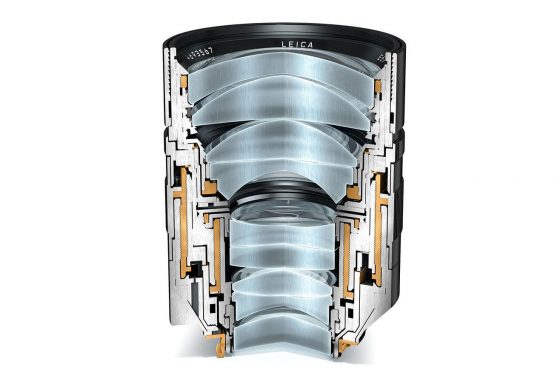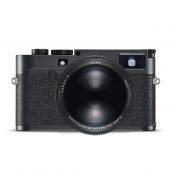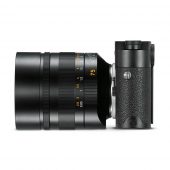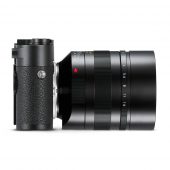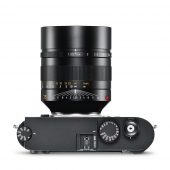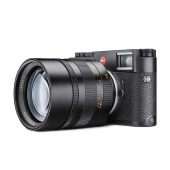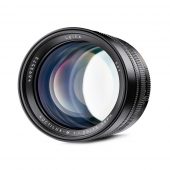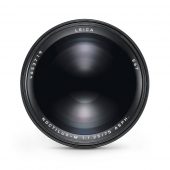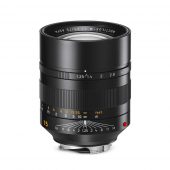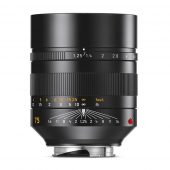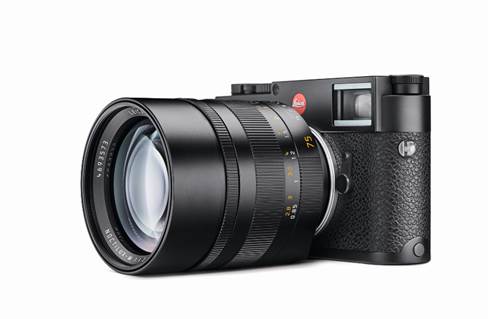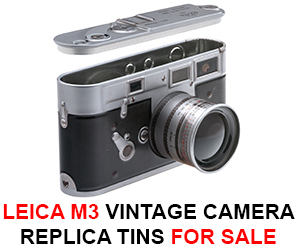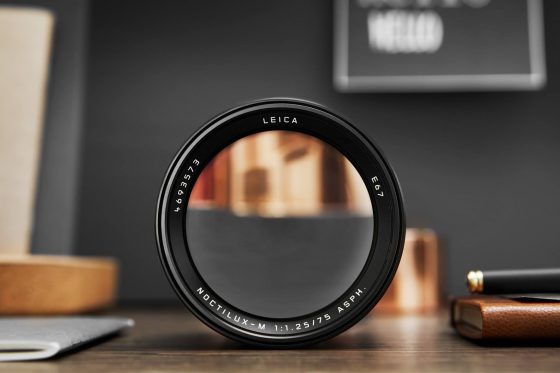
The previously rumored Leica Noctilux-M 75mm f/1.25 ASPH lens is now officially announced. The US price is $12,795 (EU price: €11,900). Shipping is expected to start in early 2018. Pre-orders are now open:
The new lens has a shallower depth of focus than that of the Noctilux-M 50mm f/0.95 APSH with a close focusing distance of 0.85m and a reproduction ratio of 1:8.8:
“The optical design of the Leica Noctilux-M 75 mm f/1.25 ASPH. features nine elements in six groups. Two aspherical elements are included in the design to ensure optimum imaging performance across the entire frame. Thanks to a floating element, accurate and sharp focusing is maintained from the minimum focusing distance of 0.85m all the way to infinity.
This exceptionally short focusing distance for a fast lens, and a reproduction ratio of 1:8.8, underline the particular suitability of the lens for portraits and highly detailed close-ups.
The harmonious bokeh of the lens is the result of the round aperture created by the eleven blades of its iris. An integrated, lockable lens hood shades the lens from stray light and protects it from accidental impacts. Thanks to its enormous resolving power, the Leica 75 mm f/1.25 ASPH. is future-proof and delivers exceptional quality when capturing images onto high resolution sensors or cropping into the composition.”
Sample photos taken with the lens can be found here and here. See also the related interview with Peter Karbe.
Press release and technical specifications:
Leica Camera Pushes Photographic Boundaries With the New Leica Noctilux-M 75 mm f/1.25 ASPH. Lens
True to the Noctilux legacy, the new lens boasts impeccable speed and exceptional imaging performance
November 29, 2017– For more than 50 years, the name ‘Noctilux’ has been synonymous with exceptional speed and outstanding optical design. Today, Leica Camera announces the newest addition to their lens portfolio – the Leica Noctilux-M 75 mm f/1.25 ASPH. Coupled with exceptional imaging performance and unique bokeh, its hair-thin depth of focus isolates subjects with extreme precision, ideal for portraits with an unmistakable “Leica look”.
A legacy of excellence
The first lens of the Noctilux family, the Leica Noctilux 50 mm f/1.2, was announced at photokina in 1966. While the original lens innovated with revolutionary optical properties, ongoing developments led to the launch of two additional generations of the Noctilux in 1975 and 2008. The additional lenses were developed under the premise of further pushing the envelope for imaging performance, each with a faster aperture than its predecessor. All Noctilux-M lenses to this day are special for their rendering and aesthetic when shot wide-open, yielding a three-dimensional “pop” that separates its subjects from the background like no other lenses. The out-of-focus areas behind the subject is smooth and pleasing to the eye, giving a lovely soft background even in the darkest of lighting scenarios.
Together with the Leica Noctilux-M 50 mm f/0.95 ASPH., the Leica Noctilux-M 75 mm f/1.25 ASPH. is the co-founder of a new family of lenses. The two current members of this family are both distinguished by their extreme maximum aperture and exceptionally high performance at all apertures, even wide open, and lend themselves to the creation of timeless images marked by a distinctive and revered Leica aesthetic.
Superior imaging performance
The upgraded features of the Noctilux-M 75 mm f/1.25 ASPH. open up entirely new opportunities in portrait and close-up photography, including a shallower depth of focus than that of the Noctilux-M 50 mm f/0.95 APSH. and a close focusing distance of 0.85m, making for a reproduction ratio of 1:8.8 for even more precise isolation of subjects. Additionally, the eleven blades of its iris ensure a soft and harmonious bokeh in out-of-focus areas.
To guarantee this extraordinary imaging performance, the nine elements in six groups that make up its optical design are manufactured from glasses with high anomalous partial dispersion and low chromatic dispersion. Two of the elements are aspherical, and reduce other potential aberrations to a hardly detectable minimum. The use of a floating element within the complex focusing mechanism guarantees a constantly high level of imaging performance throughout the entire focusing range of the lens – from its minimum focus distance to infinity.
When shooting at maximum aperture, the exceptionally shallow depth of field of the Noctilux-M 75 mm f/1.25 APSH. can be easily focused in when an electronic viewfinder such as the Leica Visoflex. Additionally, the Leica M-Adapter L transforms the Noctilux-M into an excellent lens to use in conjunction with the Leica SL. When the lens is mounted on the Leica SL, the 4.4 megapixel resolution of the camera’s EyeRes® electronic viewfinder enables particularly comfortable and extremely precise focusing.
The Noctilux-M 75mm f/1.25 ASPH. features the convenience of an integrated lens hood, which can be extended or retracted in one simple twist. The lens is complemented by a tripod adapter for safe and secure mounting of the lens on a tripod.
The Leica Noctilux-M 75 mm f/1.25 ASPH. will be available at Leica Stores, Boutiques and Dealers at the beginning of 2018.
Technical data
| Angle of view (diagonal, horizontal, vertical) | For 35 mm format (24 x 36 mm): ~ 32°, 27°, 18° For Leica M8 models (18 x 27 mm): ~ 24°, 20°, 14°, equivalent to FL of ~ 100 mm in 35 mm format1 |
| Optical design Number of elements/groups Aspherical surfaces Position of entrance pupil (at infinity) | 9/6 2 26.9 mm (in front of the bayonet) |
| Focusing Working range Scales Smallest object field/ largest reproduction ratio | 0.85 m to ∞ Combined metre/feet graduation For 35 mm format: ~ 212 x 318 mm / 1:8.8, |
| Aperture Settings/functions Smallest aperture | With click stops, half-stop detents 16 |
| Bayonet | Leica M quick-change bayonet with 6-bit bar coding for Leica M digital cameras2 |
| Filter mount | Inner thread for E67 screw-mount filters, non-rotating |
| Lens hood | Integrated, with twist-out function |
| Viewfinder | Camera viewfinder3 |
| Finish | Black anodised |
| Dimensions and weight Length to bayonet flange Largest diameter Weight | ~ 91 mm ~ 74 mm ~ 1055 g |
| Compatible cameras | All Leica M-Cameras3, 4, Leica SL-Cameras with Leica M-Adapter L |
1 The nominal focal lengths of the Leica M-Lenses relate to 35 mm format, i.e. original image frame dimensions of 24 x 36 mm. However, with dimensions of 18 x 27 mm, the sensor of the Leica M8 models is a little smaller, by a factor of 0.75. For this reason, the angle of view of this lens when mounted on a Leica M8 model corresponds to that of a lens with a focal length that is longer by a factor of 1.33 (1.33 = reciprocal of 0.75).
2 The 6-bit coding on the lens bayonet (7) enables Leica M8 digital models to identify the lens type mounted on the camera. The cameras utilise this information for the optimisation of exposure parameters and image data.
3 With the exception of the Leica M3 and the former version of the Leica MP ( professional version of the M3), all Leica M-Cameras without a 75 mm bright line frame can be retrofitted with this frame by the Customer Care department of Leica Camera AG (it then appears in the viewfinder together with the frame for 50 mm lenses).
4 This is independent of the image frame format of the respective camera – whether 18 x 27 mm (sensor size) for the Leica M8 models or 24 x 36 mm for all other Leica M models.
Like the new Leica Lenses Facebook page and join the growing Leica Lenses Facebook group.
